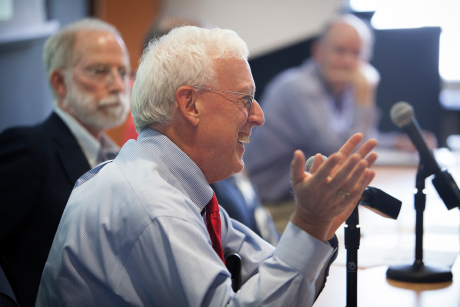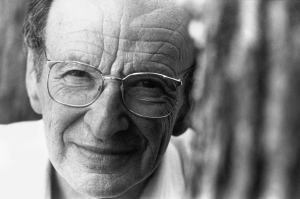Panelists recall legacy of Urie Bronfenbrenner
By Sherrie Negrea

As one of the world’s leading developmental psychology scholars, Urie Bronfenbrenner, a co-founder of the national Head Start Program, was often tapped by national leaders to inform public policy on children and families.
But when those requests conflicted with his work with students, it was clear who came first to Bronfenbrenner, a professor in Cornell’s College of Human Ecology for more than 50 years who died in 2005.
At a symposium on his legacy held Sept. 18, Stephen Ceci, the Helen L. Carr Professor of Developmental Psychology, recalled visiting Bronfenbrenner’s office one day when his assistant knocked on the door to say that Vice President Walter Mondale was on the phone.
“He said, ‘Would you ask Fritz to call me back later? I’m with my students,’” Ceci said. “Urie prioritized students over everyone. There was never anyone more impressive or more interesting or engaging to Urie than students.”
Bronfenbrenner’s ecological systems theory redefined the social sciences by proposing that human development is influenced by a framework that encompasses not only psychology, but also includes cultural, social, economic and political structures. The interaction of these systems, which are shaped into policies and programs, could either thwart or nurture optimal development.
His research legacy was to encourage developmental psychologists to consider the importance of the individual’s environment when studying behavior. Robert Sternberg, professor of human development, noted that Bronfenbrenner is unique in the field because, of all other developmental psychologists, he is “the one person whose views are still accepted.”

Sternberg said Bronfenbrenner’s work influenced his own research in environmental factors that shape human intelligence. When developing college admissions tests, for example, Sternberg said that measuring practical and creative skills in addition to analytical skills can double predictions of academic performance and reduce ethnic and socio-economic group differences by more than half.
Another key impact of Bronfenbrenner’s work was its influence on public policy. Elaine Wethington, professor of human development and of sociology, recalled her work with a group of faculty on Bronfenbrenner’s book, “The State of Americans: This Generation and the Next” (1996). Covering crime, the economy, changing family structures, poverty and education, the book presented lawmakers with findings to address core problems plaguing American society.
“Urie was way ahead of his time,” Wethington said. “He wrote that behavioral scientists need policymakers more than policymakers need behavioral scientists.”
While his colleagues believed that he had a “natural ability to communicate with policymakers, Bronfenbrenner said, ‘It wasn’t natural, I worked at it,’” noted Stephen Hamilton, professor of human development.
Bronfenbrenner, who received his bachelor’s degree from Cornell in 1938 with a dual major in psychology and music, was a gifted teacher who would meticulously prepare lecture notes, even if he had taught the class 20 times. “What he would try to do as part of class is to engage students in problem solving,” said Gary Evans, the Elizabeth Lee Vincent Professor of Human Ecology, who was a student of Bronfenbrenner’s.
Over his five decades teaching at Cornell, Bronfenbrenner influenced generations of students across campus. One of those students was former U.S. Attorney General Janet Reno ’60, said John Eckenrode, director of the Bronfenbrenner Center for Translational Research.
“When Janet Reno was on campus a few years ago as a visiting professor,” Eckenrode recalled, “she said, ‘People have often asked me throughout my career how it is that I’m as concerned and knowledgeable as I am on children and families, being a chemistry major at Cornell and a lawyer. And I always tell them it’s because I took Human Development Studies 115 with Professor Urie Bronfenbrenner.’”
Sherrie Negrea is a freelance writer.
Media Contact
Get Cornell news delivered right to your inbox.
Subscribe